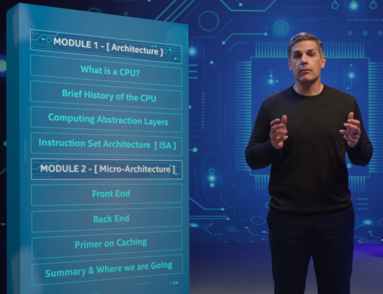| A Deep Dive Into CPU Architecture |
| Written by Nikos Vaggalis | |||
| Monday, 26 April 2021 | |||
|
Take a journey into the world of CPU Architecture with the first presentations from Intel's new YouTube series that explains the core concepts in plain language. The expert narrating "Architecture All Access: Modern CPU Architecture" is Boyd Phelps, someone who over the last 23 years has worked on some of the most well known chip designs in Intel's history; Pentium 4, Nehalem, Broadwell to the hyper-modern Tiger Lake processors. It has two parts, the first of which is 18 minutes long and talks about what a CPU is, its history, the concept of the computing abstraction layers and the Instruction Set Architecture (ISA). The series starts by praising the role that the humble CPU plays in our world,that is, the driving force behind our laptops, the machines we use to check out at the grocery store or the electronics in our cars, it is everywhere and shapes everything we do in modern society. It then continues with Part 1, the part that offers a high level overview of the concepts and a deep dive into the history of how it all began as well as how it evolved over time. From the 40s and the occurrence of the first "bug", to 1971 and the Intel 4004 single chip microprocessor for the calculator market;revolutionary as it packed the computational power of the ENIAC into a tiny device. Getting into the architecture, it continues with the language that CPU's understand;the binary system and the fundamental boolean logic that it enabled by performing AND, OR, and NOT calculations as such introducing the concept of the Logic gates. Abstraction over abstraction, we move on to the Instruction Set Architecture, or ISA for short, which is the set of instructions that defines what kinds of operations can be performed in hardware. It can be considered as the "real" language of the computer. Application programming languages are yet another layer on top,which allows programmers to describe the actions that a computer must take in a more fluent and human way,as such ignoring the ISA.And that concludes the first part of the series. Part 2, 25 mins long, is more specific and goes into the details of the microarchitecture, the instruction cycle and the building blocks of CPUs called call Front End and Back End, together with a primer on caching. In other words, once we define ISA in Part 1, in Part 2 we find out how we can go about implementing that ISA into a microarchitecture, and learn about the main building blocks of the functions of that microarchitecture. Overall, this is a short, but very good introduction, to CPU Architecture, in fact so good that it can easily be used in a first year Computer Science class. The parent series "Architecture All Access" will cover many more topics than just CPUs and it is implied that there's going to be more parts. So it's best to subscribe and hit that bell button to get reminded when that happens. Totally recommended. More InformationArchitecture All Access: Modern CPU Architecture Part 1 – Key Concepts Architecture All Access: Modern CPU Architecture Part 2 – Microarchitecture Deep Dive Related ArticlesThe Computer - What's The Big Idea? To be informed about new articles on I Programmer, sign up for our weekly newsletter, subscribe to the RSS feed and follow us on Twitter, Facebook or Linkedin.
Comments
or email your comment to: comments@i-programmer.info |
|||
| Last Updated ( Monday, 26 April 2021 ) |




